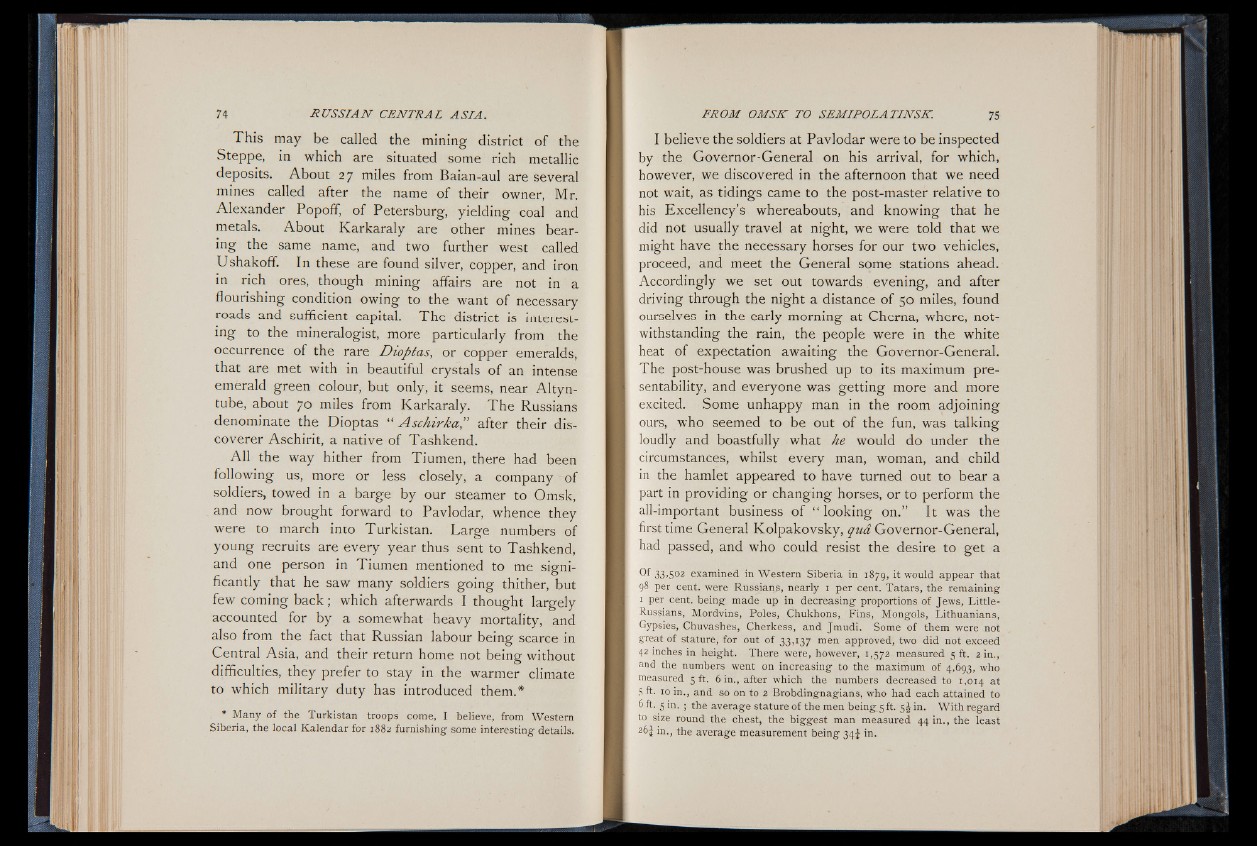
This may be called the mining district of the
Steppe, in which are situated some rich metallic
deposits. About 27 miles from Baian-aul are several
mines called after the name of their owner, Mr.
Alexander Popoff, of Petersburg, yielding coal and
metals. About Karkaraly are other mines bearing
the same name, and two further west called
Ushakoff. In these are found silver, copper, and iron
in rich ores, though mining affairs are not in a
flourishing condition owing to the want of necessary
roads and sufficient capital. The district is interesting
to the mineralogist, more particularly from the
occurrence of the rare Dioptas, or copper emeralds,
that are met with in beautiful crystals of an intense
emerald green colour, but only, it seems, near Altyn-
tube, about 70 miles from Karkaraly. The Russians
denominate the Dioptas “ AschirkaP after their discoverer
Aschirit, a native of Tashkend.
All the way hither from Tiumen, there had been
following us, more or less closely, a company of
soldiers, towed in a barge by our steamer to Omsk,
and now brought forward to Pavlodar, whence they
were to march into Turkistan. Large numbers of
young recruits are every year thus sent to Tashkend,
and one person in Tiumen mentioned to me significantly
that he saw many soldiers going thither, but
few coming b a ck ; which afterwards I thought largely
accounted for by a somewhat heavy mortality, and
also from the fact that Russian labour being scarce in
Central Asia, and their return home not being without
difficulties, they prefer to stay in the warmer climate
to which military duty has introduced them.*
* Many of the Turkistan troops come, I believe, from Western
Siberia, the local Kalendar for 1882 furnishing some interesting details.
I believe the soldiers at Pavlodar were to be inspected
by the Governor-General on his arrival, for which,
however, we discovered in the afternoon that we need
not wait, as tidings came to the post-master relative to
his Excellency’s whereabouts, and knowing that he
did not usually travel at night, we were told that we
might have the necessary horses for our two vehicles,
proceed, and meet the General some stations ahead.
Accordingly we set out towards evening, and after
driving through the night a distance of 50 miles, found
ourselves in the early morning at Cherna, where, notwithstanding
the rain, the people were in the white
heat of expectation awaiting the Governor-General.
The post-house was brushed up to its maximum pre-
sentability, and everyone was getting more and more
excited. Some unhappy man in the room adjoining
ours, who seemed to be out of the fun, was talking
loudly and boastfully what he would do under the
circumstances, whilst every man, woman, and child
in the hamlet appeared to have turned out to bear a
part in providing or changing horses, or to perform the
all-important business of “ looking on.” It was the
first time General Kolpakovsky, qua Governor-General,
had passed, and who could resist the desire to get a
Of 33>502 examined in Western Siberia in 1879, it would appear that
98 per cent, were Russians, nearly 1 per Cent. Tatars, the remaining
1 per cent, being made up in decreasing proportions o f Jews, Little-
I Russians, Mordvins, Poles, Chukhons, Fins, Mongols, Lithuanians,
I Gypsies, Chuvashes, Cherkess, and Jmudi. Some of them were not
I great of stature, for out of 33,137 men approved, two did not exceed
I 42 inches in height. There were, however, 1,572 measured 5 ft. 2 in.,
I and the numbers went on increasing to the maximum of 4,693, who
I measured 5 ft. 6 in., after which the numbers decreased to 1,014 at
I 5 ft- 10 in., and so on to 2 Brobdingnagians, who had each attained to
I 6 ft. 5 in. ; the average stature o f the men b e in g s ft. 5^ in. With regard
I to size round the chest, the biggest man measured 44 in., the least
I 26^ in., the average measurement being 34J in.